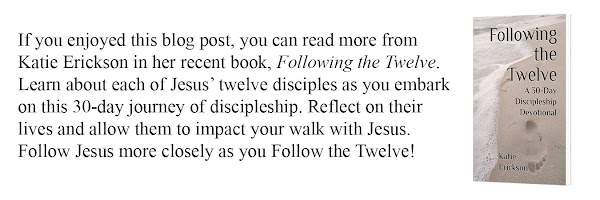She carried it back to town, and her mother-in-law saw how much she had gathered. Ruth also brought out and gave her what she had left over after she had eaten enough.
Her mother-in-law asked her, “Where did you glean today? Where did you work? Blessed be the man who took notice of you!”
Then Ruth told her mother-in-law about the one at whose place she had been working. “The name of the man I worked with today is Boaz,” she said.
“The LORD bless him!” Naomi said to her daughter-in-law. “He has not stopped showing his kindness to the living and the dead.” She added, “That man is our close relative; he is one of our guardian-redeemers.”
Then Ruth the Moabite said, “He even said to me, ‘Stay with my workers until they finish harvesting all my grain.’” Naomi said to Ruth her daughter-in-law, “It will be good for you, my daughter, to go with the women who work for him, because in someone else’s field you might be harmed.”
So Ruth stayed close to the women of Boaz to glean until the barley and wheat harvests were finished. And she lived with her mother-in-law.
- Ruth 2:18-23
This section of the narrative of Ruth gives us a turning point in the lives of Ruth and Naomi—two widows struggling to survive in Bethlehem. Ruth's encounter with Boaz is not merely a tale of kindness but an illustration of God’s sovereignty and provision. As Ruth returns from the fields with an abundant harvest, Naomi's grief begins to transform into gratitude.
In verse 18, Ruth returns to Naomi carrying an impressive amount of barley—about an ephah, equivalent to 30 pounds. That amount is a clear indication of Boaz’s generosity, but it also symbolizes the beginning of God's provision for them. Ruth's actions reflect her character: she not only shares what she has gathered but also the leftover food from her meal, showing her deep love and commitment to Naomi.
Naomi's immediate reaction in verse 19 reveals a blend of amazement and curiosity. Her questions are filled with disbelief that such abundance could come from a day’s work – by a young woman, no less. Naomi's blessing, “Blessed be the man who took notice of you,” though initially directed toward a nameless benefactor, hints at a shift from her earlier bitterness. The darkness of Naomi’s lament in Ruth 1:20-21 where she is bitter because of her life’s circumstances is slowly giving way to light.
When Ruth reveals Boaz’s name, Naomi’s reaction in verse 20 is immediate and profound. She recognizes the hand of God in this encounter, acknowledging Boaz not only as a kind man but as a “guardian-redeemer,” also sometimes called a “kinsman redeemer.”
In ancient Israel, a guardian-redeemer was a close relative responsible for protecting family interests—redeeming land, freeing relatives from slavery, and ensuring the family line continued (Leviticus 25:25, Deuteronomy 25:5-10). Naomi's revelation transforms the encounter from mere kindness to a beacon of hope for their future.
In verse 21, Ruth recounts Boaz’s invitation to stay with his workers throughout the harvest. Naomi’s response in verse 22 is both practical and protective, concerned for Ruth’s safety if she were to work for someone else. Her advice underscores the dangers faced by foreign women and reveals Naomi's growing trust in God’s unfolding plan. Her instruction to stay in Boaz’s fields not only ensures Ruth’s physical safety but also keeps her under Boaz’s protection and favor. In a broader sense, it reflects the wisdom of staying within the boundaries of God's provision, where His protection and blessings abound.
We see in verse 23 that Ruth remained in Boaz’s fields throughout both the barley and wheat harvests, which is approximately two to three months. The waiting period between the harvests represents a time of faithfulness in the mundane. Ruth’s commitment to daily gleaning illustrates that sometimes God’s provision is gradual, requiring diligence and patience.
The interactions between Ruth, Naomi, and Boaz are filled with divine orchestration veiled as coincidence. From Ruth "happening" to glean in Boaz's field (Ruth 2:3) to Boaz's unexpected kindness, each step reveals God’s invisible hand guiding their path. What might seem like chance encounters are part of God’s meticulously woven plan. Naomi’s declaration in verse 20 that God “has not stopped showing his kindness” reflects her realization that even in her darkest moments, God’s kindness had never ceased.
The role of Boaz as a guardian-redeemer not only provides immediate hope for Ruth and Naomi but also foreshadows the ultimate redemption story through Jesus Christ. Boaz's willingness to redeem reflects Christ’s willingness to redeem us—outsiders brought into God’s family through grace. Just as Boaz protected and provided for Ruth, Jesus, our redeemer, covers us with His grace, secures our future, and restores what was lost. This parallel invites readers to see the book of Ruth not just as a story of human kindness but as a glimpse into God’s redemptive plan for humanity.
God’s provision often begins in our lowest seasons, through unexpected people and ordinary circumstances. Naomi’s shift from bitterness to recognizing blessing illustrates the transformative power of God’s kindness. Ruth’s faithfulness and Boaz’s generosity foreshadow the redemptive work of Christ, the true redeemer for all of humanity.
As we glean from this passage, may we learn to trust God’s timing, seek His provision, and recognize His hand at work even in the fields of our everyday lives. For in the story of Ruth, we see a God who turns mourning into joy, scarcity into abundance, and strangers into beloved family.
This forum is meant to foster discussion and allow for differing viewpoints to be explored with equal and respectful consideration. All comments are moderated and any foul language or threatening/abusive comments will not be approved. Users who engage in threatening or abusive comments which are physically harmful in nature will be reported to the authorities.


0 comments:
Post a Comment